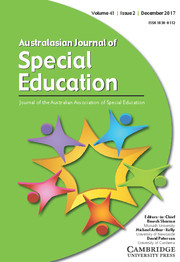No CrossRef data available.
Article contents
The Impending Special Education Qualifications Crisis in Victoria
Published online by Cambridge University Press: 26 February 2016
Abstract
Given concern about the decreasing numbers of staff with qualifications in special education in Victorian government specialist schools (schools for students with special educational needs), a survey was distributed to all 81 of these schools to gather information about teacher qualifications and age. A very high response rate of 94% was obtained. The results showed a very wide range of numbers of staff possessing a special education qualification in different schools. It is of concern that in 15 schools (almost 20% of respondent schools) fewer than half the staff had special education qualifications, while in a further 33 schools (43%) between 50% and 79% of the staff had special education qualifications. To add to this concern, there was a large proportion of older teachers in the schools, with 70% of principals and 40% of teachers likely to retire over the next five years. The implications of this for the staffing of the specialist schools are discussed, leading to suggestions for the future.
- Type
- Brief Report
- Information
- Copyright
- Copyright © The Australian Association of Special Education 2007


